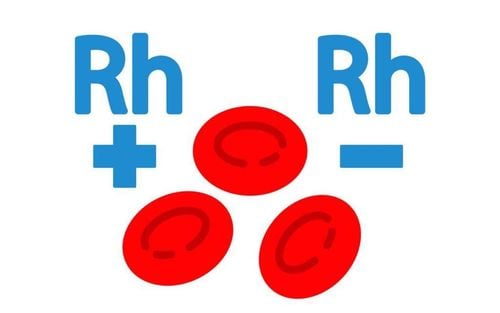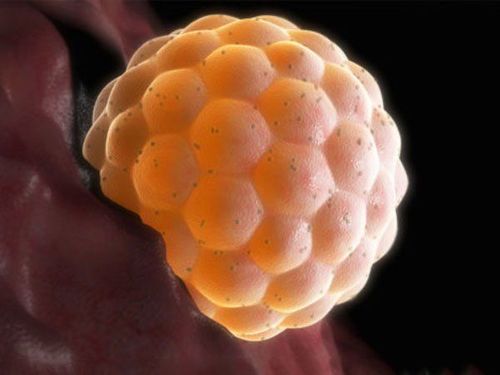This is an automatically translated article.
The article was professionally consulted with Specialist Doctor I Le Thi Phuong - Obstetrician and Gynecologist, Vinmec Ha Long International General Hospital.Fetal pregnancy is a pathology of abnormally developed placental spines, adversely affecting the fetus as well as the risk of malignancy later on. Knowledge of this pathology is not common, along with non-compliance with regular antenatal check-ups, leading to delay in treatment, with unfortunate consequences.
1. What is egg pregnancy?
Normally, when a sperm fuses with an egg, fertilization occurs. The fertilized egg will move into the uterine cavity, attach and implant on the lining of the uterus, develop into the fetus and its appendages such as the placenta and amniotic sac.Ovarian pregnancy is a pregnancy that still has fertilization but is abnormal in the development of the placental spines. At this time, the trophoblasts grow too fast, so the connective tissue inside the placenta and the blood vessels cannot keep up. As a result, the placental spines are no longer organized and no longer have blood vessels, degenerate, swell and become water sacs, bunched together like a bunch of grapes, lying in the uterine cavity and crowding the whole cell. pregnant.
Fetus eggs are divided into two types. If the egg develops into a single mass and there is no embryo at all, it is called a complete oocyte. If there is still an embryo, but because the egg grows faster, causing compression, it is called a partial ovum.
The majority of ectopic pregnancies are benign. However, there is a 15% risk of developing glioblastoma and 3% of partial ovum pregnancies.
2. What causes the formation of an oocyte?
Until now, the cause of ectopic pregnancy is still unknown. Hypotheses have been put forth that due to undernutrition, mainly protein deficiency, giving birth at too young or too old age, giving birth a lot,...In addition, there are some studies that have found Chromosomal abnormalities in trophoblasts and trophoblast cancer or immune disorders. Accordingly, if the immunity is good, the cultured cells that enter the blood vessels will be destroyed and cannot grow. In case the mother does not have enough resistance, does not create antibodies to fight the development of cultured cells, oocyte pregnancy will occur.
3. Signs of egg pregnancy like?

Visiting the doctor did not hear the fetal heartbeat. The density of the uterus is soft, not palpable or very difficult to palpate fetal parts due to compression. The uterus is larger than the gestational age due to the excessive proliferation of trophoblastic cells, except for the degenerate ovum, the uterus is smaller than the gestational age. In addition, pregnant women may experience edema, high blood pressure, and cloudy urine due to protein loss through the urine. Tachycardia, warm hand skin, shaking hands, enlarged thyroid gland and sometimes signs of jaundice, yellow urine...
Tests show that ßhCG levels are very high, higher than gestational age and rapidly increasing continuously customary. When the ultrasound also does not hear the fetal heart, does not see the image of the embryo, but only sees speckled images, which are likened to images of snowfall, images of grapes.
4. Is the egg pregnancy dangerous?
If not diagnosed early and treated early, ectopic pregnancy causing vaginal bleeding will cause the mother to fall into a state of chronic anemia. If the ovum is stimulated and spontaneously aborted, the uterus will bleed a lot and the patient will easily fall into hemorrhagic shock, which is life-threatening. Even, the uterine wall is invaded by the ovum, so it is difficult to recover well, the risk of bleeding is high, or it is easy to survive the egg and placenta and must intervene by cutting the whole uterus. If it is a malignant ovum that eats through the muscular layers of the uterus, the uterine cavity is perforated, causing intense bleeding that floods the abdomen, which is also very dangerous.In cases where the ovum is not treated definitively, it will progress to glioblastoma, requiring chemotherapy and long-term follow-up. From there, the ability to get pregnant again will be difficult.
If detected early and intervened radically, benign oocytes usually cause less serious consequences, the uterus will contract well, quickly stop bleeding and hCG levels will decrease rapidly.
5. How to treat ectopic pregnancy?
Once the pregnancy is confirmed, the decision to terminate the pregnancy must be made quickly.Fetal mass can be removed from the uterine cavity with minimal intervention on the uterus. In most cases of uncomplicated ectopic pregnancy, the doctor administers oxytocin and uses a dilator combined with a suction machine to remove the eggs until the uterus shrinks. After that, the remaining egg sacs will be removed with heart-shaped pliers. Finally, use a large and blunt spoon to scrape the uterus to ensure that no eggs are left. After the procedure, the patient is always prescribed antibiotics to prevent infection.
In cases where the ovum invades the uterine wall, is complicated to spread or has a high risk of complications into glioblastoma, the indications for prophylactic hysterectomy for the whole mass will be set out. Eligible subjects for this intervention are women over 35 years old, have had enough children or have combined uterine pathology. For malignant ovum, not only complete hysterectomy, but also have to be treated with additional anti-cancer chemotherapy afterwards.
Only patients who are young, have not had children are considered to have the issue of curettage to remove metastases, and chemotherapy to keep the uterus. However, after that, the patient needs to be closely monitored, if conservative treatment is not effective, a hysterectomy should be performed.
6. How to follow up after abortion?

Tissue samples after egg abortion are sent for pathological examination to determine whether the fetus is benign or malignant.
Usually after 3 to 4 weeks after abortion, the structure and physiology of the uterus will return to normal. If the uterus is still large, the vagina is still bleeding, there is a risk that the pregnancy has turned into trophoblast cancer.
At the same time, hCG levels will also be measured once a week from curettage until hCG becomes negative. At this time, the time for hCG quantification will be gradually spaced out if previous results were negative. Conversely, if hCG levels do not decrease or remain abnormally high, the possibility of malignancy must be considered.
Regarding getting pregnant again, it is best to delay it at least after two years. In order to increase compliance with contraceptive methods, doctors need to explain to patients that early pregnancy increases the risk of recurrent ovum as well as progression to glioblastoma. Not only that, the doctor also instructs the patient to avoid pregnancy by non-invasive methods such as using condoms in conjunction with ovulation or extra-vaginal ejaculation. Absolutely do not use oral contraceptives or intrauterine devices to facilitate monitoring after abortion.
In summary, although ovulatory pregnancy is not common, it causes severe consequences if not detected early and properly intervened. The best thing is to have a plan to have a baby, to follow regular antenatal check-ups as well as to monitor when sick, to effectively prevent pregnancy to ensure reproductive health as well as for yourself.
The first antenatal check-up when there is a delay in menstruation and regular antenatal check-ups are considered as one of the measures to prevent pregnancy. Vinmec International General Hospital currently has many maternity packages (12-27-36 weeks), in which the 12-week maternity package helps monitor the health of mother and baby right from the beginning of pregnancy, early detection. and timely intervention in health problems
Please dial HOTLINE for more information or register for an appointment HERE. Download MyVinmec app to make appointments faster and to manage your bookings easily.














